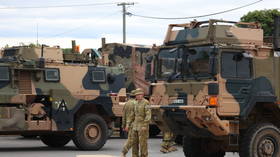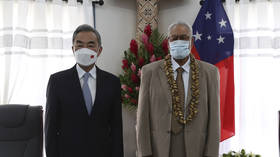Australia announces response to tensions in Asia

Australia announced on Wednesday it will conduct a Defense Strategic Review of its Armed Forces for the first time in a decade. It comes amid heightened Asia-Pacific tensions over US House Speaker Nancy Pelosi’s visit to the self-governed island of Taiwan, made despite Chinese warnings.
Speaking at a press conference in Canberra, Prime Minister Anthony Albanese said the review is intended to “prepare Australia to effectively respond to the changing regional and global strategic environment and ensure that Defence's capability and force structure is fit for purpose, affordable, and delivers the greatest return on investment.”
The review will define the country’s defense posture for approximately a decade, and will be led by Professor Stephen Smith, a former defense and foreign affairs minister, along with Angus Houston, a former chief of the Defence Force.
Speaking at the same press conference, Houston explained that the security circumstances “have changed dramatically over the recent past,” and becoming the worst he has seen in his “career and lifetime.”
“A land war in Europe, all sorts of issues in north-east Asia, particularly around Taiwan, east China Sea, issues in South-East Asia and issues up on the Himalayan border and northern India,” he explained, mentioning also “disruptive technologies coming into play” as another security threat.
When asked how significant this review is in the context “of a more belligerent China in the region,” the prime minister explained that the context is “well-known.”
“We live in an era where there’s strategic competition and increased tension in our region. And where China has taken a more aggressive posture in the region,” Albanese said.
He added, though, that when it comes to Taiwan, the Australian government’s position has not changed. Australia supports the One China principle but maintains unofficial diplomatic ties with Taiwan through representative offices and institutions that function as de facto embassies and consulates.
“We don’t want to see any unilateral change to the status quo. And we’ll continue to work with partners to promote peace and stability across the Taiwan Strait,” he said.
Last year, then-Defense Minister Peter Dutton warned that conflict over Taiwan involving China can’t be ruled out. He stressed, however, that the government is focused on having “good relations” with Beijing.
Australia’s relationship with China has been deteriorating drastically in the last year. Canberra has condemned Beijing’s move to sign a security pact with the Solomon Islands, a Pacific nation located about 1,000 miles (1,700km) from Australia’s northeast coast. Australia claimed that China wants to use the agreement to establish a military foothold in the area – something that Beijing denies. Australia’s new Labor government has vowed to “step up” the country’s own presence in the Pacific, after making China a major campaign issue during the recent election.
China, in turn, has been accusing Australia and its partners of encouraging an “arms race” in the South Pacific region. In May, Chinese foreign ministry spokesperson Zhao Lijian said that the Australian government had not consulted with its other partners last year when it unveiled the AUKUS deal, a security pact involving Australia, the UK and US that paves the way for Canberra to acquire nuclear-powered submarines.
The review will also consider how Australia’s capabilities can work in cooperation with the United States, the United Kingdom and other key partners.













